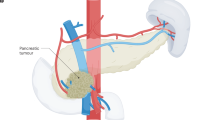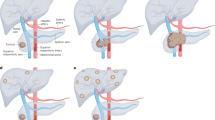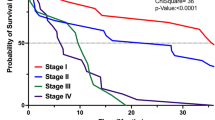Abstract
Almost 30% of patients with pancreatic cancer present with large, locally advanced tumors in the absence of distant metastases. Because surgical resection is frequently contraindicated by vascular invasion, locally advanced pancreatic cancer has a dismal prognosis with a 6–10-month median survival. Recent advances in the multimodality treatment of other gastrointestinal malignancies have not altered the management of patients with locally advanced pancreatic cancer, a clinical dilemma reflected by the number of nonrandomized trials and anecdotal reports addressing this difficult disease. Our review summarizes the current status of aggressive surgical resection and neoadjuvant chemoradiation for locally advanced pancreatic cancer and suggests a treatment algorithm for patients with this disease based upon published clinical evidence.
This is a preview of subscription content, access via your institution
Access options
Subscribe to this journal
Receive 12 print issues and online access
$209.00 per year
only $17.42 per issue
Buy this article
- Purchase on Springer Link
- Instant access to full article PDF
Prices may be subject to local taxes which are calculated during checkout

Similar content being viewed by others
References
American Cancer Society (2004) Cancer facts and figures. Atlanta: American Cancer Society
National Cancer Institute: Surveillance, Epidemiology, and End Results (SEER) (online April 2005) SEER*Stat 6.1 Database: Incidence—SEER 9 Regs Public-Use, Nov 2004 Sub (1973-2002). [http://www.seer.cancer.gov/seerstat/] (accessed 5 July 2005)
Haller DG (2003) Chemotherapy for advanced pancreatic cancer. Int J Radiat Oncol Biol Phys 56 (Suppl): S16–S23
Fortner JG (1973) Regional resection of cancer of the pancreas: a new surgical approach. Surgery 73: 307–320
Lillemoe KD et al. (1996) Pancreaticoduodenectomy. Does it have a role in the palliation of pancreatic cancer? Ann Surg 223: 718–725
Sohn TA et al. (2000) Resected adenocarcinoma of the pancreas—616 patients: results, outcomes, and prognostic indicators. J Gastrointest Surg 4: 567–579
Nakao A et al. (2004) Extended radical resection versus standard resection for pancreatic cancer: the rationale for extended radical resection. Pancreas 28: 289–292
Shoup M et al. (2004) Is there a role for staging laparoscopy in patients with locally advanced, unresectable pancreatic adenocarcinoma? J Gastrointest Surg 8: 1068–1071
Liu RC and Traverso LW (2005) Diagnostic laparoscopy improves staging of pancreatic cancer deemed locally unresectable by Computed Tomography. Surg Endosc 19: 638–642
Crile G Jr (1970) The advantages of bypass operations over radical pancreatoduodenectomy in the treatment of pancreatic carcinoma. Surg Gynecol Obstet 130: 1049–1053
Neoptolemos JP et al. (2004) A randomized trial of chemoradiotherapy and chemotherapy after resection of pancreatic cancer. N Engl J Med 350: 1200–1210
Benassai G et al. (2000) Factors influencing survival after resection for ductal adenocarcinoma of the head of the pancreas. J Surg Oncol 73: 212–218
Kayahara M et al. (1995) Surgical strategy for carcinoma of the pancreas head area based on clinicopathologic analysis of nodal involvement and plexus invasion. Surgery 117: 616–623
Fortner JG et al. (1996) Tumor size is the primary prognosticator for pancreatic cancer after regional pancreatectomy. Ann Surg 223: 147–153
Howard TJ et al. (2003) Efficacy of venous reconstruction in patients with adenocarcinoma of the pancreatic head. J Gastrointest Surg 7: 1089–1095
Leach SD et al. (1998) Survival following pancreaticoduodenectomy with resection of the superior mesenteric-portal vein confluence for adenocarcinoma of the pancreatic head. Br J Surg 85: 611–617
Roder JD et al. (1996) Carcinoma of the periampullary region: who benefits from portal vein resection? Am J Surg 171: 170–174
Bachellier P et al. (2001) Is pancreaticoduodenectomy with mesentericoportal venous resection safe and worthwhile? Am J Surg 182: 120–129
Sasson AR et al. (2002) En bloc resection for locally advanced cancer of the pancreas: is it worthwhile? J Gastrointest Surg 6: 147–157
Nakao A (2003) Debate: extended resection for pancreatic cancer; the affirmative case. J Hepatobiliary Pancreat Surg 10: 57–60
Tseng JF et al. (2004) Pancreaticoduodenectomy with vascular resection: margin status and survival duration. J Gastrointest Surg 8: 935–949
Poon RT et al. (2004) Pancreaticoduodenectomy with en bloc portal vein resection for pancreatic carcinoma with suspected portal vein involvement. World J Surg 28: 602–608
Nakagohri T et al. (2003) Survival benefits of portal vein resection for pancreatic cancer. Am J Surg 186: 149–153
Launois B et al. (1999) Who benefits from portal vein resection during pancreaticoduodenectomy for pancreatic cancer? World J Surg 23: 926–929
Pedrazzoli S et al. (1998) Standard versus extended lymphadenectomy associated with pancreatoduodenectomy in the surgical treatment of adenocarcinoma of the head of the pancreas: a multicenter, prospective, randomized study. Lymphadenectomy Study Group. Ann Surg 228: 508–517
Yeo CJ et al. (2002) Pancreaticoduodenectomy with or without distal gastrectomy and extended retroperitoneal lymphadenectomy for periampullary adenocarcinoma, part 2: randomized controlled trial evaluating survival, morbidity, and mortality. Ann Surg 236: 355–366
Beger HG et al. (2003) Treatment of pancreatic cancer: challenge of the facts. World J Surg 27: 1075–1084
Yeo CJ et al. (1997) Pancreaticoduodenectomy for pancreatic adenocarcinoma: postoperative adjuvant chemoradiation improves survival. A prospective, single-institution experience. Ann Surg 225: 621–633
Spitz FR et al. (1997) Preoperative and postoperative chemoradiation strategies in patients treated with pancreaticoduodenectomy for adenocarcinoma of the pancreas. J Clin Oncol 15: 928–937
Klinkenbijl JH et al. (1999) Adjuvant radiotherapy and 5-fluorouracil after curative resection of cancer of the pancreas and periampullary region: phase III trial of the EORTC gastrointestinal tract cancer cooperative group. Ann Surg 230: 776–782
Kim HJ et al. (2002) Does neoadjuvant chemoradiation downstage locally advanced pancreatic cancer? J Gastrointest Surg 6: 763–769
Pisters PW et al. (1998) Rapid-fractionation preoperative chemoradiation, pancreaticoduodenectomy, and intraoperative radiation therapy for resectable pancreatic adenocarcinoma. J Clin Oncol 16: 3843–3850
Moertel CG et al. (1981) Therapy of locally unresectable pancreatic carcinoma: a randomized comparison of high dose (6000 rads) radiation alone, moderate dose radiation (4000 rads + 5-fluorouracil), and high dose radiation + 5-fluorouracil: The Gastrointestinal Tumor Study Group. Cancer 48: 1705–1710
Burris HA III et al. (1997) Improvements in survival and clinical benefit with gemcitabine as first-line therapy for patients with advanced pancreas cancer: a randomized trial. J Clin Oncol 15: 2403–2413
Ikeda M et al. (2002) A phase I trial of weekly gemcitabine and concurrent radiotherapy in patients with locally advanced pancreatic cancer. Br J Cancer 86: 1551–1554
Li CP et al. (2003) Concurrent chemoradiotherapy treatment of locally advanced pancreatic cancer: gemcitabine versus 5-fluorouracil, a randomized controlled study. Int J Radiat Oncol Biol Phys 57: 98–104
Klaassen DJ et al. (1985) Treatment of locally unresectable cancer of the stomach and pancreas: a randomized comparison of 5-fluorouracil alone with radiation plus concurrent and maintenance 5-fluorouracil—an Eastern Cooperative Oncology Group study. J Clin Oncol 3: 373–378
Fisher BJ et al. (1999) Analysis of the clinical benefit of 5-fluorouracil and radiation treatment in locally advanced pancreatic cancer. Int J Radiat Oncol Biol Phys 45: 291–295
Van Cutsem E et al. (2004) Systemic treatment of pancreatic cancer. Eur J Gastroenterol Hepatol 16: 265–274
Moore MJ et al. (2003) Comparison of gemcitabine versus the matrix metalloproteinase inhibitor BAY 12-9566 in patients with advanced or metastatic adenocarcinoma of the pancreas: a phase III trial of the National Cancer Institute of Canada Clinical Trials Group. J Clin Oncol 21: 3296–3302
Van Cutsem E et al. (2004) Phase III trial of gemcitabine plus tipifarnib compared with gemcitabine plus placebo in advanced pancreatic cancer. J Clin Oncol 22: 1430–1438
Rocha Lima CM et al. (2004) Irinotecan plus gemcitabine results in no survival advantage compared with gemcitabine monotherapy in patients with locally advanced or metastatic pancreatic cancer despite increased tumor response rate. J Clin Oncol 22: 3776–3783
Moore M et al. (2005) Erlotinib improves survival when added to gemcitabine in patients with advanced pancreatic cancer. A phase III trial of the National Cancer Institute of Canada Clinical Trials Group (NCIC-CTG). 2005 Gastrointestinal Cancer Symposium Program/Proceedings [abstract #77]: a121
Maheshwari V et al. (2005) Phase I study of celecoxib, irinotecan, and concurrent radiotherapy in the preoperative treatment of locally-advanced pancreatic cancer [abstract #109]. 2005 Gastrointestinal Cancer Symposium Program/Proceedings
Crane CH et al. (2003) Initial experience combining cyclooxygenase-2 inhibition with chemoradiation for locally advanced pancreatic cancer. Am J Clin Oncol 26: S81–S84
Singh SM et al. (1990) Surgical palliation for pancreatic cancer. The UCLA experience. Ann Surg 212: 132–139
Nieveen van Dijkum EJ et al. (2005) Quality of life after curative or palliative surgical treatment of pancreatic and periampullary carcinoma. Br J Surg 92: 471–477
Ammori JB et al. (2003) Surgical resection following radiation therapy with concurrent gemcitabine in patients with previously unresectable adenocarcinoma of the pancreas. J Gastrointest Surg 7: 766–772
Fogelman DR et al. (2004) The evolution of adjuvant and neoadjuvant chemotherapy and radiation for advanced pancreatic cancer: from 5-fluorouracil to GTX. Surg Oncol Clin N Am 13: 711–735, x
Aristu J et al. (2003) Surgical resection after preoperative chemoradiotherapy benefits selected patients with unresectable pancreatic cancer. Am J Clin Oncol 26: 30–36
Wilkowski R et al. (2004) Effect of chemoradiotherapy with gemcitabine and cisplatin on locoregional control in patients with primary inoperable pancreatic cancer. World J Surg 28: 1011–1018
Talamonti MS et al. (2000) Eastern Cooperative Oncology Group Phase I trial of protracted venous infusion fluorouracil plus weekly gemcitabine with concurrent radiation therapy in patients with locally advanced pancreas cancer: a regimen with unexpected early toxicity. J Clin Oncol 18: 3384–3389
Safran H et al. (2001) Paclitaxel and concurrent radiation for locally advanced pancreatic cancer. Int J Radiat Oncol Biol Phys 49: 1275–1279
Epelbaum R et al. (2002) Phase II study of gemcitabine combined with radiation therapy in patients with localized, unresectable pancreatic cancer. J Surg Oncol 81: 138–143
Blackstock AW et al. (2003) Cancer and leukemia group B (CALGB) 89805: phase II chemoradiation trial using gemcitabine in patients with locoregional adenocarcinoma of the pancreas. Int J Gastrointest Cancer 34: 107–116
Viret F et al. (2003) Docetaxel and radiotherapy and pancreatic cancer. Pancreas 27: 214–219
Brunner TB et al. (2003) Phase I trial of strictly time-scheduled gemcitabine and cisplatin with concurrent radiotherapy in patients with locally advanced pancreatic cancer. Int J Radiat Oncol Biol Phys 55: 144–153
Okusaka T et al. (2004) Phase II study of radiotherapy combined with gemcitabine for locally advanced pancreatic cancer. Br J Cancer 91: 673–677
Rich T et al. (2004) Phase II study of external irradiation and weekly paclitaxel for nonmetastatic, unresectable pancreatic cancer: RTOG-98-12. Am J Clin Oncol 27: 51–56
Acknowledgements
AJM receives funding from the NIH (DK60485) and the Competitive Medical Research Foundation of the University of Pittsburgh School of Medicine, PA, USA.
Author information
Authors and Affiliations
Corresponding author
Ethics declarations
Competing interests
The authors declare no competing financial interests.
Glossary
- ADJUVANT TREATMENT
-
Treatment given to patients after surgical resection
- NEOADJUVANT THERAPY
-
Treatment given to unresected patients
- CLINICAL BENEFIT RESPONSE INDEX
-
A composite measure of pain (pain intensity and analgesic consumption), Karnofsky performance status and body weight
- 3-DIMENSIONAL CONFORMAL RADIOTHERAPY
-
A technique that conforms the spatial distribution of the high radiation dose to the shape of the tumor while decreasing the volume of normal surrounding tissue exposed
Rights and permissions
About this article
Cite this article
Maheshwari, V., Moser, A. Current management of locally advanced pancreatic cancer. Nat Rev Gastroenterol Hepatol 2, 356–364 (2005). https://doi.org/10.1038/ncpgasthep0240
Received:
Accepted:
Issue Date:
DOI: https://doi.org/10.1038/ncpgasthep0240
This article is cited by
-
URG11 predicts poor prognosis of pancreatic cancer by enhancing epithelial–mesenchymal transition-driven invasion
Medical Oncology (2014)
-
Biological and therapeutic significance of tissue transglutaminase in pancreatic cancer
Amino Acids (2009)
-
HER2 Gene Amplification and Chromosome 17 Copy Number Do Not Predict Survival of Patients with Resected Pancreatic Adenocarcinoma
Digestive Diseases and Sciences (2008)
-
Systematic review, including meta-analyses, on the management of locally advanced pancreatic cancer using radiation/combined modality therapy
British Journal of Cancer (2007)



